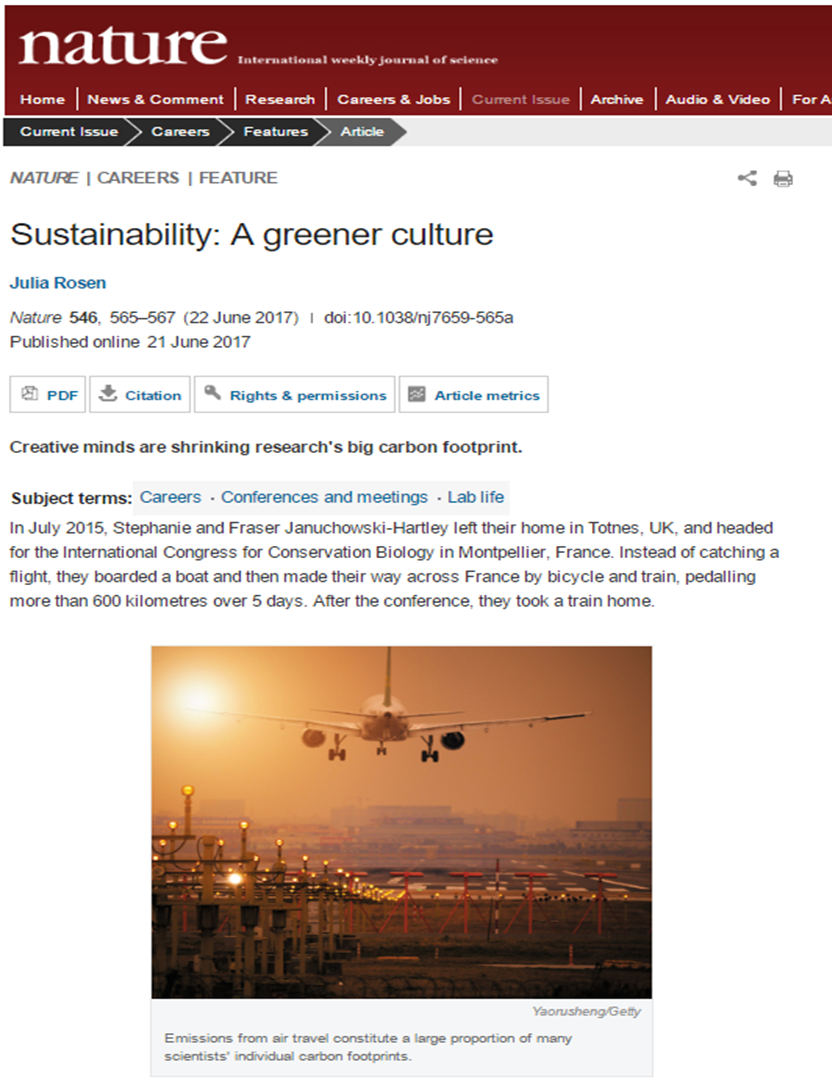Because of a recent Washington Post piece by Sam Denby, it seems like a good time to collect some principles for fair reporting about the environmental impact of several transportation modes.
Principle 1: Report that less long-distance travel benefits the environment
What matters most is how much long-distance travel we do. There are many ways of reducing the average frequency of long-distance travel events while preserving what is important in our work and valuable in our lives. Sam Denby’s piece discusses trips from Dubai to Sydney and from Frankfort to Washington, but it is silly to hold miles constant when discussing such trips. The alternative to flying from Dubai to Sydney is not driving the same route. The alternative is flying less, and it is definitely greener.
Principle 2: Never exaggerate small improvements over bad options
One could compare a flight from Chicago to North Carolina to a single person driving in a car for the same journey. But that trip alone in a car for 820 miles already has a large carbon impact. A family of four environmentalists, if they must travel to North Carolina, can drive. A single environmentalist, who must travel to North Carolina, can consider a bus. We cannot as a nation meet our climate commitments if we travel too often from Chicago to North Carolina. We must contemplate the value and frequency of the trips.
Principle 3: Report equivalent comparisons across transportation modes
On those occasions when, as just one part of a broader analysis, it makes sense to compare transportation modes holding constant the trip distance, then make the comparisons fair.
Option 1: best cases. If you measure miles per gallon (mpg) of a fancy new jet operating at full capacity, then compare it to the passenger mpg of a cutting-edge electric train, a new bus at full capacity, and a hybrid car with 4 passengers.
Option 2: average cases. Alternatively, if you compare trips for average automobile mpg and occupancy, then your computation for flights must: (a) use actual occupancy rates for flights, and (b) use averages for the real-world fleet, not best cases for fancy new planes.
Existing media reports
Let’s look at some actual examples in recent media coverage. I feel Sam Denby in the Washington Post does poorly by these principles, but you can judge.
Fivethirtyeight in 2015 has the title “Every Time You Fly, You Trash The Planet — And There’s No Easy Fix.” This piece does well, emphasizing global carbon emissions goals and assuming that traveling less is one of the options. Denby criticizes the actual transportation mode comparison, because the data source was a carbon offset company, but Denby doesn’t actually say what’s wrong with the numbers, and it seems to me the comparison here does not exaggerate the environmental harm of flying. It seems to basically agree with the other sources discussed below.
Much of the recent controversy arises from the work of Michael Sivak at the University of Michigan, which argues that the efficiency of flying has improved relative to the efficiency of automobiles. I like it that Sivak attempts to follow “option 2” above for consistent comparisons. I don’t know enough about engineering to reconcile his numbers with somewhat differing numbers from environmental organizations. A nice article at Yale Climate Connections treats Sivak’s estimates as authoritative. On the other hand, a somewhat earlier 2013 analysis by the International Council on Clean Transportation somewhat disputes the numbers, making flying look worse than other modes on a passenger mpg basis. For me, the key thing is that Sivak’s numbers do not really make frequent flying look green. Of the existing sources, Sivak’s estimates are comparatively favorable to flying when reporting under “Principle 3” above, which may be fine as far as it goes. But to report the truth more broadly, we must still keep in mind “Principle 1” and “Principle 2”.
My own summary of this complex literature is simple and short: Flying less is greener.

